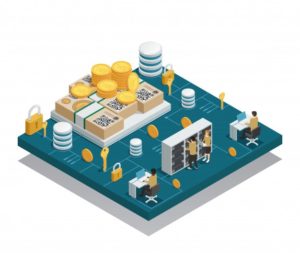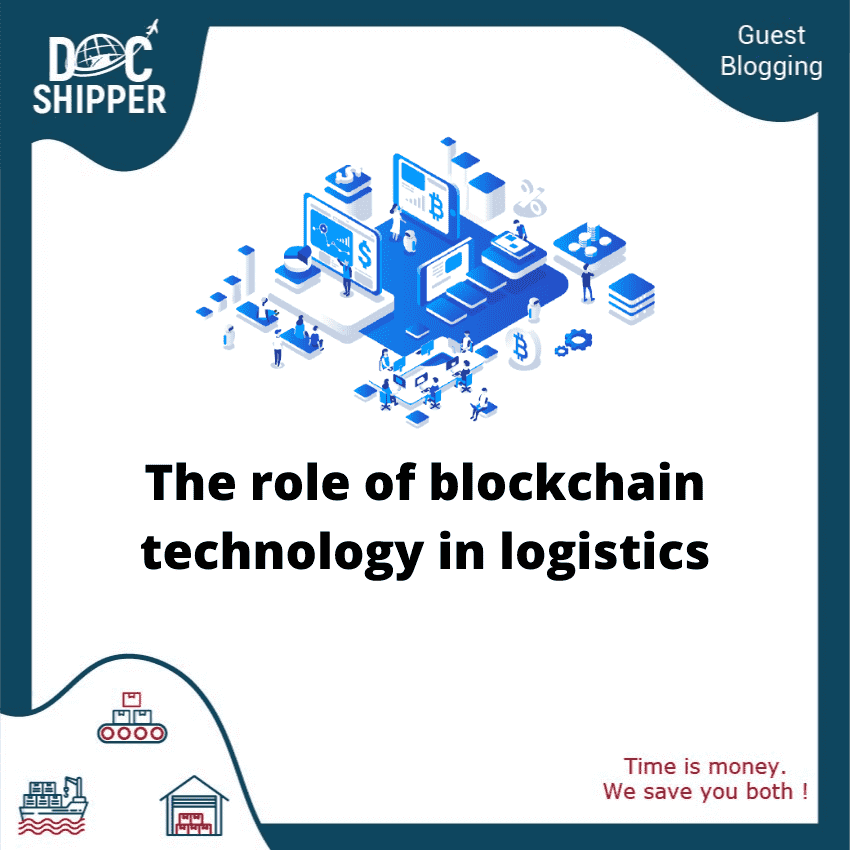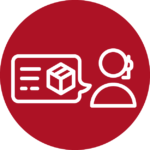Table of Contents
Blockchain is one of the most striking technological trends of the last few years. The concept of blockchain has become widespread due to the growing popularity of cryptocurrency. However, this technology is developing not only in the field of cryptocurrencies. It is suitable in various areas that strive to improve information structures and strengthen digital data security. The logistics industry is no different: blockchain is in the TOP Logistics Technologies of 2021. It helps manage complex supply chains worldwide and build transparent communications between all of its participants.
Blockchain technology: what it is and how it works
Blockchain is a linear chain consisting of many interconnected information blocks. In fact, it is a database reliably protected by encryption and decentralization. It can be compared to a ledger where transactions are recorded sequentially. Many people have heard of blockchain only in the context of cryptocurrency because it appeared as a technology for launching bitcoin (the basis of the basics, the first cryptocurrency). The concept was proposed by Satoshi Nakamoto (a pseudonym for a person or group of people) in 2008 and was first put into practice a year later. In the cryptocurrency market, blockchain has been used to ensure the privacy of transaction participants. The technology quickly became popular in other fields of activity as well.
The secret of blockchain technology lies in its unique properties: distributed storage and decentralization. It means that the data does not have a single copy, and the system is not controlled by a specific authority. Each of the participants (nodes) who have joined the blockchain network can save a local copy of all data. This copy is updated as new transactions are added, along with the copies of other participants. It is impossible to change data in one block without changing the entire public chain, which means no risk of falsification and information leakage.
DocShipper Tips : Interested in our services ? Need some personalized advices ? Our experts will contact you within 24h !
The contents of a blockchain-protected file can only be seen by the person who has the keys, even though others can access it. Communication and data exchange in a network where there is no unified management are built on the basis of the consensus algorithm: decisions within the group are made following
principles of equality and fairness. It doesn't matter if users trust each other: in any case, they must agree on operating principles that apply to all of them.
This scheme makes the technology indispensable for various business areas where there is a need to protect the information, including logistics.
The benefits of using blockchain in logistics
The logistics industry has great potential: in 2017, it was estimated at $ 8.1 trillion, and by 2023, according to Transparency Market Research, it will increase by almost 2 times. Despite the promising activity, logistics companies and retailers lose the lion's share of profits due to ineffectively organized work. Complex and too long supply chains, cumbersome paperwork, which is often done manually, a high probability of errors due to the human factor, the cost of intermediaries, cyber attacks — these are all about logistics problems.
The main difficulty is associated with bureaucratic barriers. It is especially true for the international delivery of containerized cargo where a large number of countries, companies, and government agencies are involved, and they all have their own rules for maintaining and accounting for documentation. For example, during the delivery of refrigerated cargo from East Africa to the EU, about 30 participants are involved only in order to obtain a transportation permit and put a stamp. Just imagine, the cost of processing documents can range from 15% to 50% of the cost of physical transport!
According to experts, blockchain is the only (!) technology that can eliminate these barriers to global trade by creating a reliable and secure system for storing, processing, tracking, and exchanging data between participants from all over the world. According to DHL, the use of blockchain in logistics leads to global success: it can help increase international trade by 15% and increase world GDP by 5%.
Logistics processes optimized by blockchain
Tracking cargo and accounting data
Problem: maintenance of cumbersome paperwork and the use of local accounting systems by participants in the supply chain (CRM, BPM, ERP, etc.),
which leads to data inconsistency and increases the risk of losing transport and cargo.
Solution: creating a unified digital document management system, when data is stored in the cloud and all interested parties have access to it, to track the geolocation of goods in real-time
Examples of brands: Walmart (food supply management, Food Trust blockchain), Unilever (tea supply management, Provenance blockchain), Nestle (food ingredients supply management, Food Trust blockchain).
Authentication and quality control
Problem: High probability of spoiling food and medical products during delivery due to violation of the conditions, which poses a threat to the health of consumers. According to statistics, 10% of drugs in the world are counterfeit. In addition, 8.5% of pharmaceutical shipments are exposed to inappropriate temperatures, so they quickly deteriorate and do not pass customs inspection.
Solution: equipping cargo with an RFID tag for auto-identification: tracking location and interactions between different participants in the supply chain, measuring important indicators (temperature, humidity, etc.).
Examples of brands: Everledger (storage of data on the diamond industry), MediLedger (supply management of medical supplies), SkyCell (development of containers for medical cargo with IoT), Organic, Co-op (verification of the origin of goods, Provenance blockchain).
Improving delivery service
Problem: a large number of bureaucratic procedures with 30 or more parties who exchange paper documents, which significantly increases the delivery time.
Solution: the use of smart contracts that automate the workflow and exchange of information, goods, money, and other valuables to reduce delivery terms and identify fraudulent activities.
Examples of brands: OOCL, Evergreen Marine, CMA CGM, COSCO, Yang Ming within the GSBN project, BMW, Renault, H&M Group (VeChain ecosystem).
Astuce DocShipper : Interested in our services ? Need some advices on logistics ? Our experts are answering within 24h. Contact them
Invoicing
Problem: High risk of fraud and human error in international financial transactions.
Solution: Implementing blockchain, along with IoT sensors and smart contracts, to track delivery phases (right through to shipment) and automate billing, which improves the accuracy and security of transactions.
Examples of brands: Tallysticks (developing a blockchain platform for processing payments and invoices), Blockshipping (developing a container platform), Visa (launching a service for B2B Connect global payments).
Data reliability control
Problem: lack of accurate data on the cost of delivery of certain goods, as well as the complexity of control of the transportation process by the customer, which creates optimal conditions for speculation and smuggling.
Solution: Consolidation of data in one system, where participants in the supply chain can check transport/cargo information at any time to ensure there are no delays or violations of the contract.
Examples of brands: Provenance (development of a transparent BaaS platform).
Formalization of working methods
Problem: the lack of uniform standards and transparent rules regarding the liability of the parties participating in the delivery, which increases the number of fraudsters and speculators in the freight market.
Solution: building a reliable trading platform based on blockchain and smart contracts to ensure transparency of the terms of transactions, including setting responsibility for each of the participants for violation of these terms.
Examples of brands: ShipChain (integrating smart contracts into blockchain solutions).
Settlement of disputes
Problem: Disputes about payments between transport industry entities arise due to inaccurate data in invoices and late payment, which often leads to a "freeze" of transactions in the amount of $ 140 billion.
Solution: storing important data on the terms of cooperation in a single system with the ability to check them at any time to eliminate misunderstandings and prevent conflict situations with payment.
Examples of brands: FedEx (launching a solution for storing payment records).
Astuce DocShipper : Need some advices ? Our experts will help you from A to Z ! Don't hesitate to contact them !
FAQ | The role of blockchain technology in logistics
What is the purpose of blockchain certificate of authenticity ?
This certificate may be useful in the event that you need to contact the after sales service, a dealer, or anyone. As your data is protected by blockchain no one can change them.
How to know that a blockchain certificate of authenticity is genuine ?
Some authenticity checker exists on internet and are reliable to see if it is a genuine certificate.
How to use blockchain in tracking cargo and data ?
You can use blockchain in tracking cargo by creating a unified digital document management system, when data is stored in the cloud and all interested parties have access to it, to track the geolocation of goods in real-time.
DocShipper info: Do you like our article today? For your business interest, you may like the following useful articles :
- Coronavirus (Covid-19) impacts on import/export business
- How does Coronavirus impact international supply chain?
- 💡How to find a good product to sell?
- How to find your reliable supplier for your business? [Fair Trade Guide]
- AliExpress | Use the Chinese panacea to sell your products online
- How a sourcing strategy can rocket your margin?
DocShipper Advise : We help you with the entire sourcing process so don't hesitate to contact us if you have any questions!
- Having trouble finding the appropriate product? Enjoy our sourcing services, we directly find the right suppliers for you!
- You don't trust your supplier? Ask our experts to do quality control to guarantee the condition of your goods!
- Do you need help with the logistics? Our international freight department supports you with door to door services!
- You don't want to handle distribution? Our 3PL department will handle the storage, order fulfillment, and last-mile delivery!
DocShipper | Procurement - Quality control - Logistics
Alibaba, Dhgate, made-in-china... Many know of websites to get supplies in Asia, but how many have come across a scam ?! It is very risky to pay an Asian supplier halfway around the world based only on promises! DocShipper offers you complete procurement services integrating logistics needs: purchasing, quality control, customization, licensing, transport...
Communication is important, which is why we strive to discuss in the most suitable way for you!






